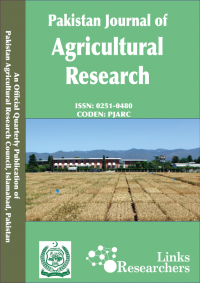PHYTOTOXIC EFFECTS OF CALOTROPIS PROCERA, TAMARIX APHYLLA AND PEGANUM HARMALA ON PLANT GROWTH OF WHEAT AND MUSTARD
Muhammad Mudasar Aslam ⃰, Muhammad Jamil**, Ijaz Malook**, Amana Khatoon*, Ali Rehman*, Abdur Rahim***, Pirzada Khan*, Shakir Ullah Khan Shakir*, Shahid Irfan*, Faizan Ullah****, Khair Ul Bashar**, Mahideen Afridi** and Shafiq Ur Rehman*
ABSTRACT
Phytotoxic effects of many plants are known on growth of different useful crops. This research study was designed to find out phytotoxic effects of Calotropis procera, Tamarix aphylla and Peganum harmala on seed germination and seedling length of wheat and mustard. Results showed that seed germination of wheat was significantly decreased by 5%, 10%, 15%, 20% and 25% while mustard seeds were resistant and were affected by higher dilutions (15%, 20% and 25%) of all plant extracts. Roots of both wheat and mustard were highly affected by plant aqueous extracts at all concentrations (5%, 10%, 15%, 20% and 25%) but shoots were inhibited by higher concentrations (20% and 25%). This study revealed that wheat is more sensitive to different plant extracts as compared to mustard. It is thus concluded that inhibitory effect increases with the increase of extracts concentration.
To share on other social networks, click on any share button. What are these?






